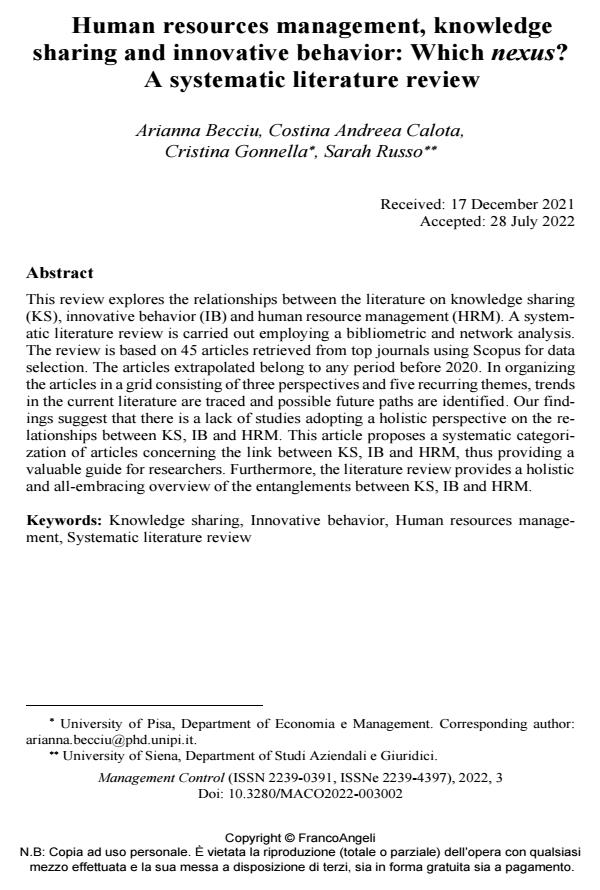Human resources management, knowledge sharing and innovative behavior: Which nexus? A systematic literature review
Journal title MANAGEMENT CONTROL
Author/s Arianna Becciu, Costina Andreea Calota, Cristina Gonnella, Sarah Russo
Publishing Year 2022 Issue 2022/3
Language English Pages 25 P. 13-37 File size 342 KB
DOI 10.3280/MACO2022-003002
DOI is like a bar code for intellectual property: to have more infomation
click here
Below, you can see the article first page
If you want to buy this article in PDF format, you can do it, following the instructions to buy download credits

FrancoAngeli is member of Publishers International Linking Association, Inc (PILA), a not-for-profit association which run the CrossRef service enabling links to and from online scholarly content.
This review explores the relationships between the literature on knowledge sharing (KS), innovative behavior (IB) and human resource management (HRM). A systematic literature review is carried out employing a bibliometric and network analysis. The review is based on 45 articles retrieved from top journals using Scopus for data selection. The articles extrapolated belong to any period before 2020. In organizing the articles in a grid consisting of three perspectives and five recurring themes, trends in the current literature are traced and possible future paths are identified. Our findings suggest that there is a lack of studies adopting a holistic perspective on the relationships between KS, IB and HRM. This article proposes a systematic categorization of articles concerning the link between KS, IB and HRM, thus providing a valuable guide for researchers. Furthermore, the literature review provides a holistic and all-embracing overview of the entanglements between KS, IB and HRM.
Keywords: Knowledge sharing, Innovative behavior, Human resources management, Systematic literature review
- Galileo e il pendolo: un esempio di scienza viva Benedetto Scoppola, in CADMO 1/2023 pp.13
DOI: 10.3280/CAD2023-001002 - La relazione tra l'esperienza degli amministratori e il business plan: un'indagine empirica sulle imprese quotate in Italia Emmadonata Carbone, Sara Saggese, Fabrizia Sarto, in MANAGEMENT CONTROL 1/2023 pp.69
DOI: 10.3280/MACO2023-001004
Arianna Becciu, Costina Andreea Calota, Cristina Gonnella, Sarah Russo, Human resources management, knowledge sharing and innovative behavior: Which nexus? A systematic literature review in "MANAGEMENT CONTROL" 3/2022, pp 13-37, DOI: 10.3280/MACO2022-003002